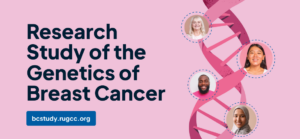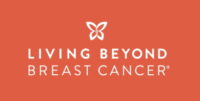Natalie Nudelman, Program Coordinator
Mylie Siegel, Rutgers University Genetic Counseling Master’s Student
Valentine’s Day is a time to celebrate love, and what better way to show you care than by supporting breast cancer research? Every breakthrough in treatment, every new discovery, and every step closer to a cure is made possible through research—and you can be a part of it.
By participating in research studies, you help scientists and doctors develop better treatments, improve early detection methods, and bring hope to countless individuals affected by breast cancer.
One organization at the forefront of this mission is Living Beyond Breast Cancer. This nonprofit organization aims to connect people with trusted information and community support, and that moderated a discussion on new research at the 2024 San Antonio Breast Cancer Symposium. At this discussion, Dr. Neil Vasan, MD, PhD, reported on a new therapy called inavolisib, that may be effective in patients with a specific type of breast cancer that has historically been resistant to endocrine therapy measures as a treatment. Specifically, individuals with PIK3CA genetic mutations in ER-positive breast cancer tumor tissue, meaning the mutation in PIK3CA was not a genetic change they were born with but formed only in the cancer cells, may have better treatment options than ever before.
This is significant because about 40% of patients who have ER-positive breast cancer have PIK3CA mutations in their tumor tissue. This advancement through clinical trials is noteworthy because participants were enrolled based on liquid biopsies, which are much less invasive than the historically required tissue sample biopsies. This means the study participants could submit their DNA through blood or saliva samples rather than through a small surgical removal of their skin or other tissue. Not only does this approach improve the quality of life of participants, but it also encourages more people to participate in research studies.
Whether you volunteer for a clinical trial, donate to research initiatives, or spread awareness, your support makes a difference. Here are some key reasons why you might want to get involved:
1. Advance Medical Knowledge
- Research studies help scientists and doctors discover new treatments, medications, and preventive strategies.
- Your participation contributes to the understanding of diseases and their impact on different populations.
2. Improve Healthcare for the Future
- Every breakthrough in medicine comes from research volunteers who helped make it possible.
- You play a role in shaping better care options for future generations.
3. Access to Innovative Treatments
- Some research studies provide early access to new therapies and medical advancements before they become widely available.
- Participants often receive specialized medical care and close monitoring from experts.
4. Personal Health Benefits
- Many studies offer free health screenings, tests, or medical evaluations that could help you detect potential health concerns early.
- You may gain insights into your health while contributing to a significant cause.
5. Support the Fight Against Disease
- Whether it’s breast cancer, heart disease, or another condition, research is essential for finding better treatments and, ultimately, cures.
- Your involvement can directly impact the development of life-saving interventions.
6. Help Underrepresented Groups Be Heard
- Some populations are underrepresented in medical research, leading to gaps in healthcare knowledge and treatment effectiveness.
- By participating, you can help ensure more inclusive and accurate medical discoveries.
7. Make a Difference in the Lives of Others
- Research studies rely on volunteers to move forward.
- Your participation could save lives and improve health outcomes for people worldwide.
You can learn more about the incredible progress that is currently being made in cancer research funded by the Tower Cancer Research Foundation at https://www.towercancer.org/member_sort/researcher/.
By answering a few questions and providing a saliva sample, you can take part in cancer research today by joining the Rutgers University Study of the Genetics of Breast Cancer. This research at Rutgers University aims to understand more about the genetic basis of breast cancer for developing drugs that will improve current treatment options. All genders are invited to participate in this research regardless of whether they’ve had cancer.

This Valentine’s Day, be a valentine for the cure.
Show your love by taking action and helping to create a future without breast cancer.
Reference
https://www.lbbc.org/community/events/updates-from-the-2024-san-antonio-breast-cancer-symposium

